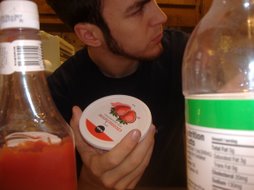First, when sacrifices were offered, it says that they were a "soothing aroma to YHWH" [NASB]. This phrase is used 16 times in Leviticus to anthropomorphically describe God's pleasure in the sacrifices [1.9, 1.13, 1.17, 2.2, 2.9, 2.12, 3.5, 3.16, 6.15, 6.21, 8.21, 8.28, 17.6, 23.13, 23.18, 26.31]. The most pleasing blood sacrifice to God, however, is the death of His Son. Paul notes this in Eph 5.2. It is the most pleasing to God because of the finality of atonement it brings.
Second, is atonement. This word is found 49 times in Leviticus. It implies the idea of appeasement, forgiveness, and/or a covering for sin. Atonement is also part of the idea behind the powerful NT word "propitiation" [found only in Rom 3.25, Heb 2.17, 1 Jn 2.2, 1 Jn 4.10].
Third, the phrase "without defect" [NASB] is used 18 times in Leviticus [also 18x in Numbers]. This phrase is used to show that those animals offered as sacrifices must be blameless and have no blemishes.
Lastly, and most significantly, the melody line of Leviticus is holiness. YHWH commands His people to "Be holy because I am holy" in 11.44-45, 19.2, 20.7, 20.26, and 21.8. He said that if they obeyed Torah they would be a holy nation to Him and for Him [Ex 19.5-6]. Israel's distinctness in how they lived was to point to the distinctness and holiness of their God. This likewise applies to us as the New Covenant people of God [1 Pe 1.16]. He has beckoned us to walk in such a way that shows forth who He is. He has given us the perfect example of this in His Son.




No comments:
Post a Comment